| Listing 1 - 10 of 12 | << page >> |
Sort by
|
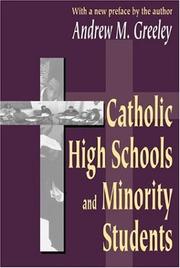
ISBN: 0765809508 Year: 2002 Publisher: New Brunswick Transaction
Abstract | Keywords | Export | Availability | Bookmark
 Loading...
Loading...Choose an application
- Reference Manager
- EndNote
- RefWorks (Direct export to RefWorks)
Catholic high schools --- Educational surveys --- Minorities --- Education (Secondary)
Book
Year: 2002 Publisher: Frankfurt a.M. PH02
Abstract | Keywords | Export | Availability | Bookmark
 Loading...
Loading...Choose an application
- Reference Manager
- EndNote
- RefWorks (Direct export to RefWorks)
Unter dem Titel "Bildung, Bedeutung und Gebrauch des russischen Verbalaspekts" wird ein Lehrbuch vorgestellt, bestimmt für den Fortgeschrittenenunterricht an Universitäten, Hochschulen und Gymnasien, für den anspruchsvollen, sprachwissenschaftlich fundierten Selbstunterricht ("Autonomes Lernen", besser "autonomes Studium"), sowie für Lehrkräfte an Hochschulen, Sprachschulen, Gymnasien. Der vorliegende Teil 1 enthält die theoretischen Grundlagen - eine didaktisierte Zusammenfassung der Ergebnisse aus unseren Arbeiten zur Terminativität/Aterminativität des russischen Verbs (Schlegel 1999) und zum aspektualen Bezugsmoment (Schlegel 2001).
linguistics --- advanced teaching --- universities --- colleges --- high schools --- Bedeutung --- Bildung --- Fortgeschrittenenunterricht --- Gebrauch --- Grundlagen --- Lehrbuch --- russischen --- Russland --- Schlegel --- Selbstunterricht --- Slavische Sprachwissenschaft --- Teil --- Theortische --- Verbalaspekts
Book
Year: 2002 Publisher: Frankfurt a.M. PH02
Abstract | Keywords | Export | Availability | Bookmark
 Loading...
Loading...Choose an application
- Reference Manager
- EndNote
- RefWorks (Direct export to RefWorks)
Unter dem Titel "Bildung, Bedeutung und Gebrauch des russischen Verbalaspekts" wird ein Lehrbuch vorgestellt, bestimmt für den Fortgeschrittenenunterricht an Universitäten, Hochschulen und Gymnasien, für den anspruchsvollen, sprachwissenschaftlich fundierten Selbstunterricht ("Autonomes Lernen", besser "autonomes Studium"), sowie für Lehrkräfte an Hochschulen, Sprachschulen, Gymnasien. Der vorliegende Teil 1 enthält die theoretischen Grundlagen - eine didaktisierte Zusammenfassung der Ergebnisse aus unseren Arbeiten zur Terminativität/Aterminativität des russischen Verbs (Schlegel 1999) und zum aspektualen Bezugsmoment (Schlegel 2001).
advanced teaching --- universities --- colleges --- high schools --- linguistics --- Bedeutung --- Bildung --- Fortgeschrittenenunterricht --- Gebrauch --- Grundlagen --- Lehrbuch --- russischen --- Russland --- Schlegel --- Selbstunterricht --- Slavische Sprachwissenschaft --- Teil --- Theortische --- Verbalaspekts
Book
Year: 2002 Publisher: Frankfurt a.M. PH02
Abstract | Keywords | Export | Availability | Bookmark
 Loading...
Loading...Choose an application
- Reference Manager
- EndNote
- RefWorks (Direct export to RefWorks)
Unter dem Titel "Bildung, Bedeutung und Gebrauch des russischen Verbalaspekts" wird ein Lehrbuch vorgestellt, bestimmt für den Fortgeschrittenenunterricht an Universitäten, Hochschulen und Gymnasien, für den anspruchsvollen, sprachwissenschaftlich fundierten Selbstunterricht ("Autonomes Lernen", besser "autonomes Studium"), sowie für Lehrkräfte an Hochschulen, Sprachschulen, Gymnasien. Der vorliegende Teil 1 enthält die theoretischen Grundlagen - eine didaktisierte Zusammenfassung der Ergebnisse aus unseren Arbeiten zur Terminativität/Aterminativität des russischen Verbs (Schlegel 1999) und zum aspektualen Bezugsmoment (Schlegel 2001).
linguistics --- advanced teaching --- universities --- colleges --- high schools --- Bedeutung --- Bildung --- Fortgeschrittenenunterricht --- Gebrauch --- Grundlagen --- Lehrbuch --- russischen --- Russland --- Schlegel --- Selbstunterricht --- Slavische Sprachwissenschaft --- Teil --- Theortische --- Verbalaspekts
Book
ISBN: 1280328037 0203307151 0203132866 9780203307151 Year: 2002 Publisher: London New York Routledge
Abstract | Keywords | Export | Availability | Bookmark
 Loading...
Loading...Choose an application
- Reference Manager
- EndNote
- RefWorks (Direct export to RefWorks)
This new edition of Managing the Secondary School brings up to date the consideration of the talks and skills of the headtecher which was a feature of the first edition. The book deals with all aspects of the headteachers' role including marketing the school and managing the budget. It also deals in some detail with the problems of managing change and with the role of governors and parents in today's schools. Throughout the book, Joan Dean considers the implications of the Education Reform Act and the National Cucciculum. Managing the Secondary School is essential reading
High schools --- High school principals --- Principals, High school --- Principals, Secondary school --- Principals, Senior high school --- Secondary school principals --- Senior high school principals --- School principals --- Secondary schools --- Schools --- Education, Secondary --- Administration.
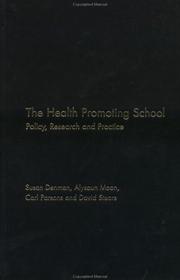
ISBN: 0415239524 0415239532 Year: 2002 Publisher: London : RoutledgeFalmer,
Abstract | Keywords | Export | Availability | Bookmark
 Loading...
Loading...Choose an application
- Reference Manager
- EndNote
- RefWorks (Direct export to RefWorks)
Elementary schools --- High schools --- Social skills --- Ecoles primaires --- Ecoles secondaires --- Habiletés sociales --- Health promotion services --- Study and teaching --- Promotion de la santé --- Etude et enseignement --- Health promotion services.

ISBN: 1134553595 0203165608 128002125X 0203280288 1134553609 9786610021253 9780203165607 9780415239523 0415239524 9780415239530 0415239532 9781134553600 9781134553556 1134553552 9781134553594 0415239524 0415239532 Year: 2002 Publisher: London New York RoutledgeFalmer
Abstract | Keywords | Export | Availability | Bookmark
 Loading...
Loading...Choose an application
- Reference Manager
- EndNote
- RefWorks (Direct export to RefWorks)
Under the UK Labour Government (1997-2001) there have been clear signs of a willingness to revive the 'pastoral' curriculum in schools and to develop stronger links between the health and eductaion sectors. This book, based on empirical work undertaken in England and throughout Europe, explores such government policy and in particular the development of the health promoting school.The authors provide a detailed examination of the health promoting school movement in Europe, including application of concepts, policies, research and practice to the National Healthy Schools Standards in Englan
Elementary schools --- High schools --- Social skills --- Health promotion services --- Study and teaching --- Ecoles primaires --- Ecoles secondaires --- Habiletés sociales --- Health promotion services. --- Promotion de la santé --- Etude et enseignement
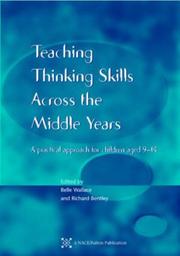
ISBN: 1138159611 0203065344 1136629092 9781136629099 1853467677 9781853467677 9780203065341 9781136629167 9781136629235 9781138159617 1136629165 Year: 2002 Publisher: London
Abstract | Keywords | Export | Availability | Bookmark
 Loading...
Loading...Choose an application
- Reference Manager
- EndNote
- RefWorks (Direct export to RefWorks)
This book presents a practical framework for the teaching of thinking skills and problem-solving with children across Key Stages 2 and 3. Using examples of topics from the National Curriculum, teachers are presented with classroom techniques and activities, which systematically develop these skills. While accommodating the needs of all learners, the book caters for the need to differentiate learning activities to extend the more able learners. Included are suggested activities for developing thinking and problem-solving skills relating to the National Numeracy Curriculum, the National Literacy
Thought and thinking. --- Problem solving in children. --- Education, Elementary. --- Education, Secondary. --- Children --- High school education --- High school students --- Secondary education --- Secondary schools --- Teenagers --- Education --- High schools --- Elementary education --- Primary education (Great Britain) --- School children --- Child psychology --- Mind --- Thinking --- Thoughts --- Educational psychology --- Philosophy --- Psychology --- Intellect --- Logic --- Perception --- Psycholinguistics --- Self --- Education (Secondary) --- Education (Elementary)
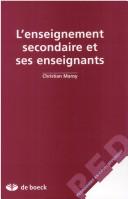
ISSN: 07775245 ISBN: 2804141225 9782804141226 Year: 2002 Volume: *39 Publisher: Bruxelles: De Boeck,
Abstract | Keywords | Export | Availability | Bookmark
 Loading...
Loading...Choose an application
- Reference Manager
- EndNote
- RefWorks (Direct export to RefWorks)
Educational surveys --- High school teachers --- Educational sociology --- High schools --- Education --- Professeurs (Enseignement secondaire) --- Sociologie de l'éducation --- Ecoles secondaires --- Job descriptions --- Social conditions --- Attitudes --- Administration --- Enquêtes --- Descriptions d'emploi --- Conditions sociales --- Écoles privées --- Enseignement secondaire --- Education, Secondary --- Private schools --- Travail --- Sociologie de l'éducation --- Enquêtes --- Enseignement --- Teaching --- Enseignants --- Écoles privées - Enquêtes - Belgique francophone --- Enseignement secondaire - Enquêtes - Belgique francophone --- Professeurs (Enseignement secondaire) - Travail - Enquêtes - Belgique francophone --- Education, Secondary - Belgium - Wallonia --- High school teachers - Belgium - Wallonia --- Private schools - Belgium - Wallonia --- Educational surveys - Belgium --- Reseau libre (enseignement) --- Administration.
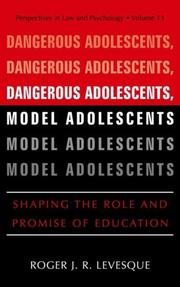
ISBN: 1280200278 9786610200276 0306475405 0306467674 Year: 2002 Publisher: New York : Kluwer Academic/Plenum,
Abstract | Keywords | Export | Availability | Bookmark
 Loading...
Loading...Choose an application
- Reference Manager
- EndNote
- RefWorks (Direct export to RefWorks)
Teachers make a difference. As someone who grew up in one of the po- est and rural areas of a poor state and ended up attending elite graduate and professional schools, I have much to credit my public school teachers. My teachers sure struggled much to teach an amazingly wide variety of students from different backgrounds, abilities, and hopes. Given that re- ity, which undoubtedly repeats itself across the United States and globe, one would think that I should be quite hesitant to criticize a system that produces countless grateful students and productive citizens. I agree. The pages that follow surely can be perceived as yet another attack on already much maligned schools that do produce impressive outcomes despite their limited resources, increased obligations, and the sustained barrage of attacks from competing interest groups. Some may even view the text as an affront to the inalienable rights of parents to raise their children as they see fit. Others surely could understand the analysis as another assault on our decentralized legal and school systems that should retain the right to balance the needs of communities, parents, schools, and students. I clearly did not intend, and do not see the ultimate result, as yet another diatribe on the manner teachers, parents and communities treat students.
Education, Secondary --- Teenagers --- Problem children --- Educational law and legislation --- Social aspects --- Education --- Law --- Psychology, clinical. --- Law and Psychology. --- Education, general. --- Clinical Psychology. --- Psychological aspects. --- Clinical psychology. --- Psychology. --- Education. --- Psychiatry --- Psychology, Applied --- Psychological tests --- Children --- Education, Primitive --- Education of children --- Human resource development --- Instruction --- Pedagogy --- Schooling --- Students --- Youth --- Civilization --- Learning and scholarship --- Mental discipline --- Schools --- Teaching --- Training --- Behavioral sciences --- Mental philosophy --- Mind --- Science, Mental --- Human biology --- Philosophy --- Soul --- Mental health --- Difficult children --- Maladjusted children --- Behavior disorders in children --- Adolescents --- Teen-agers --- Teens --- Young adults (Teenagers) --- High school education --- High school students --- Secondary education --- Secondary schools --- High schools --- Education (Secondary)
| Listing 1 - 10 of 12 | << page >> |
Sort by
|

 Search
Search Feedback
Feedback About UniCat
About UniCat  Help
Help News
News